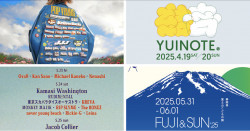
September 9, 2010
A Guy Called Gerald
Gerald Simpson has harsh words for today’s dance music
Originally published on metropolis.co.jp on September 2010

Courtesy of Laboratory Instinct
It may be hard to recall in an era of megaclubs and corporate sponsorship, but dance music was once an underground phenomenon. English producer Gerald Simpson—on his own and as part of the 808 State collective—fueled dance culture’s emergence into the mainstream with anthems like “Voodoo Ray.”
Electronic music’s increasing popularity brought Simpson to Japan in the early ’90s, but the producer was already creating tracks on synthesizers and sequencers designed by the country’s wily engineers. “I’ve always relied on the music machinery from Japan,” he writes from his home base in Berlin ahead of an appearance at the Labyrinth festival in Naeba. “If it wasn’t for Roland, we wouldn’t have had the 303, 606, 909, 101—and therefore no acid house/techno. And if it wasn’t for Technics, we probably wouldn’t have had hip-hop.”
Helping to birth electro in the late ’80s and jungle in the ’90s, Simpson has in recent visits offered eclectic sets that fuse anything from electro to breakbeats to techno, hip-hop and jazz. He writes that his new album, Tronic Jazz, was an experiment “to find ways to sculpt analog sounds from digital waveforms” in response to the current obsession with vintage Japanese synths among young DJs weaned on music software.
“People crave the analog sound these days because they mistakenly believe analog is more ‘authentic’ than digital,” he explains. “But if you really want the analog sound, you can make it with digital software. The new school of producers is a bit confused when it comes to dance music. They think it’s all about repeating two-bar loops for 32 bars and then putting a filter on top before going to a breakdown. It’s all become a bit formulaic, and the poor people who should be entertained just shuffle around on the dancefloor and when something happens like a breakdown or buildup they pretend to be excited.”
In his opinionated blog (http://aguycalledgerald.wordpress.com), Simpson criticizes the way that commercialization has dumbed down “what was the cutting-edge future of dance music.” But hasn’t money always influenced pop music? “I don’t think I had so much exposure to it as now,” he replies. “When ‘Voodoo Ray’ started to blow up in [legendary Manchester club] Hacienda, I was in London. Now, it seems that the mainstream has got totally involved and it’s just shameless hype, which was the realm of pop music in the ’80s and what we were trying to get away from.”
Simpson goes so far as to predict the virtual end of electronic music. “I think mainstream techno is just going to be like one constant tone. In the late ’80s, a riff in a house/techno track could last for about 16 bars—almost like a jazz track. By the early ’90s, the producers got sick of being ripped off by DJs and a lot of them decided to call it quits, so the DJs took over and pretended they were producing their own tracks but were just making four-bar, loop-type tracks. Zipping forward to today, we are on half-bar loops. That’s why every track, no matter what it is—dubstep or deep house—sounds like that nursery rhyme ‘Humpty Dumpty.’ So by 2020, it’ll just be a tone.”
Asked what kind of set he’ll be performing for Labyrinth, Simpson stresses that he’s not a DJ. “To me, playing CDs and vinyl is playing frozen sound,” he explains. “I make music with Reason software on two laptops, and when I perform I’m taking my studio to the crowd. To me, DJing is something I do occasionally, but my main focus is to make music. I’m a producer and I need to bring something that has never been heard before or will never again be played the same way. I like to perform tracks I made 25 years ago and make them sound like I made them yesterday.”
Simpson also distinguishes himself in not seeking your typical hands-in-the-air response from clubbers. “I’m from the age of real dancing,” he says. “Everyone on the dance floor had their own thing going on. You would see a girl on the floor and I swear you would get hard just watching her move. If you both connected, you would almost be fucking on the dance floor. Can you imagine at that moment giving a shit about the name of the DJ or what BPM the track was? OK, world… the DJ is there to turn you on. Dance like how you want to fuck.”
Naeba Greenland
Labyrinth 2010. Techno, electronica: DJs Donato Dozzy, Function, etc. Live: A Guy Called Gerald, Mathew Jonson and more. Sep 18-20, from 7pm, ¥16,000. Naeba, Niigata. www.mindgames.jp







